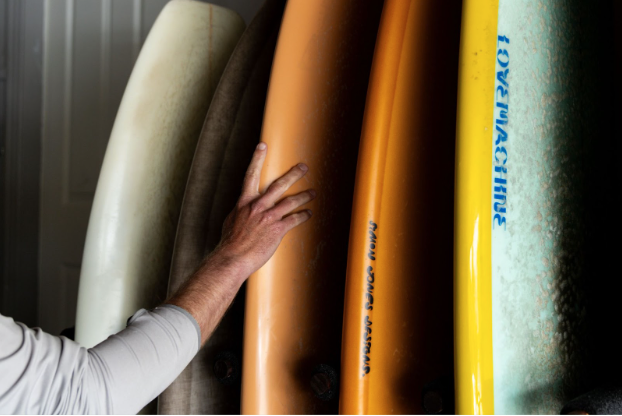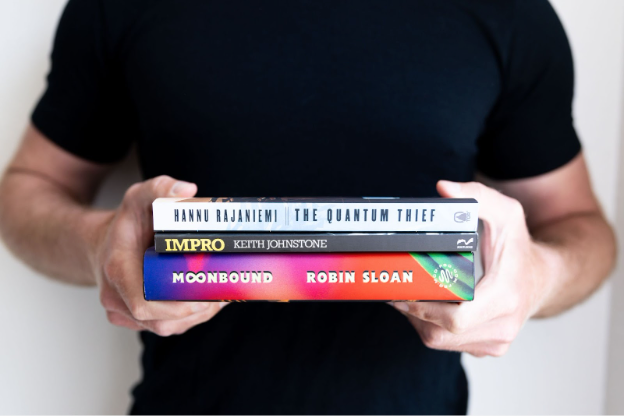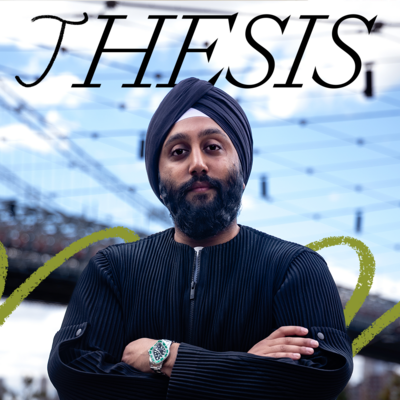.png)
Where a Sci-fi Novelist Surfs for Story Ideas
The surfboards, split keyboard, and improv guidebook fueling Eliot Peper’s AI worldbuilding
April 29, 2025 · Updated January 25, 2026
Was this newsletter forwarded to you? Sign up to get it in your inbox.
When Eliot Peper isn’t busy writing science fiction or leading narrative projects for tech companies, he’s usually surfing. For the head of story at Portola, where he helped create AI alien creatures Tolans, it’s like writing: Just as an author can feel paralyzed by a narrative’s vast possibilities, surfers have to consider variations in wind, tides, swell, and depth. For Peper, the thrill lies in finding the most graceful solution. The cleanest line.
In yesterday’s Thesis essay, Peper argued that LLMs don’t just help us produce better movies, marketing, or apps—they unlock whole new ways to tell stories. We asked him about the tools, books, and rituals that drive his work.
My keyboard: Kinesis Freestyle2. “As a writer I spend a lot of time typing, and my split keyboard ensures my wrists stay happy by keeping them a natural distance apart and reducing extension with a zero-degree front-to-back slope.”
My laptop stand: Soundance. “It keeps the screen of my 16-inch MacBook Pro at the right height.”
My lighting: Svallet desk lamps. “They’re cute, functional, extremely affordable, and made entirely from recycled plastic.”
My surfboards: “Surfing is how I process experience, develop ideas, and solve the gnarliest of narrative problems.” From left to right: a 6’2” Flathead twin fish hand-shaped by Trevor Gordon, a 6’4” Pedestrian Ship by Lovemachine, a 7’1” FM twinzer hand-shaped by Ryan Lovelace (which Peper’s Tolan helped design), a 7’2” Massive twin pin hand-shaped by Simon Jones, and an 8’1” Lovemachine.
The art of the craft
One of the hardest parts of being a storyteller, Peper says, is disabusing himself of the stubborn belief “that I can solve problems by thinking about them hard enough”: “There are more theories of narrative than you could parse in a lifetime, and while I find them intellectually fascinating, I also find them to be of very little practical help when I'm working on a story. It's like how an autopsy can tell you everything about how a person died, but not how to bring a person to life.”
Storytelling is best approached as a craft, he says—something honed through practice, not meditation. When Peper gets an idea, he begins writing as soon as possible and tries to make his way to the end: “Only once the story exists in its complete, if extremely rough, form, can I begin to analyze it as a reader, to feel out what's working and what's not working, to make it sing.”
A boy transported
Asked to describe his relationship with books, Peper recalls that in elementary school he took a “handwork” class where students were taught to knit, sew, and crochet. “The teacher would read us stories while we worked, and my projects always turned out to be 10 percent the size of my classmates' because I'd be so absorbed in the story that I'd stop knitting,” he says.
He’d hide in the stacks at the library to avoid going home, he says, “ to have a little more time among all the fascinating worlds just waiting to be explored on every shelf.”
“William Gibson taught me to see the real world through the lens of science fiction,” Peper says of his early inspirations. “Ursula K. Le Guin drew the cleanest narrative lines, not a word out of place. Michael Crichton erased the boredom of long family road trips. Terry Pratchett used fiction to tell truths nonfiction couldn't handle.”
Today, Peper has written 11 novels—including, most recently, Foundry—but he still considers himself a reader first, writer second. (Follow his writing by subscribing to his newsletter.)
“Books are the closest thing we have to telepathy,” Peper says. “They open windows into other minds, other hearts, other times, other lives. So stop reading this interview right now and go crack open a book. You can thank me later.”
Naturally, we asked Peper for a few recommendations:
Impro by Keith Johnstone: “A concise masterclass in improv from one of the 20th century's great acting teachers. Johnstone's ideas and practical exercises for developing creativity, storytelling, and imagination can be applied far beyond the stage, including prompting LLMs to bring characters to life, which feels a lot like you’re an improv coach giving actors direction.”
Moonbound by Robin Sloan: “There’s nothing quite like a good story well told. Moonbound is one of those. I wish I could read it again for the first time. Moonbound is also the first piece of science fiction I've encountered that genuinely engages with the promise and dangers of current advances in AI (without ever needing to say so explicitly).”
The Jean le Flambeur trilogy by Hannu Rajaniemi: “It almost feels like some kind of psychedelic fantasy, except that all of it is scientifically plausible in the universe we happen to live in. But this isn’t a dry speculative treatise. It’s a blazing-fast, in media res story about a master thief pulling off a series of heists that will change the very fabric of reality and make you question the stories you tell yourself about who you are.”
To read more essays like this, subscribe to Every, and follow us on X at @every and on LinkedIn.
We build AI tools for readers like you. Automate repeat writing with Spiral. Organize files automatically with Sparkle. Write something great with Lex. Deliver yourself from email with Cora.
We also do AI training, adoption, and innovation for companies. Work with us to bring AI into your organization.
Get paid for sharing Every with your friends. Join our referral program.
The Only Subscription
You Need to
Stay at the
Edge of AI
The essential toolkit for those shaping the future
"This might be the best value you
can get from an AI subscription."
- Jay S.
Join 100,000+ leaders, builders, and innovators

Email address
Already have an account? Sign in
What is included in a subscription?
Daily insights from AI pioneers + early access to powerful AI tools










.png)

.png)
Comments
Don't have an account? Sign up!